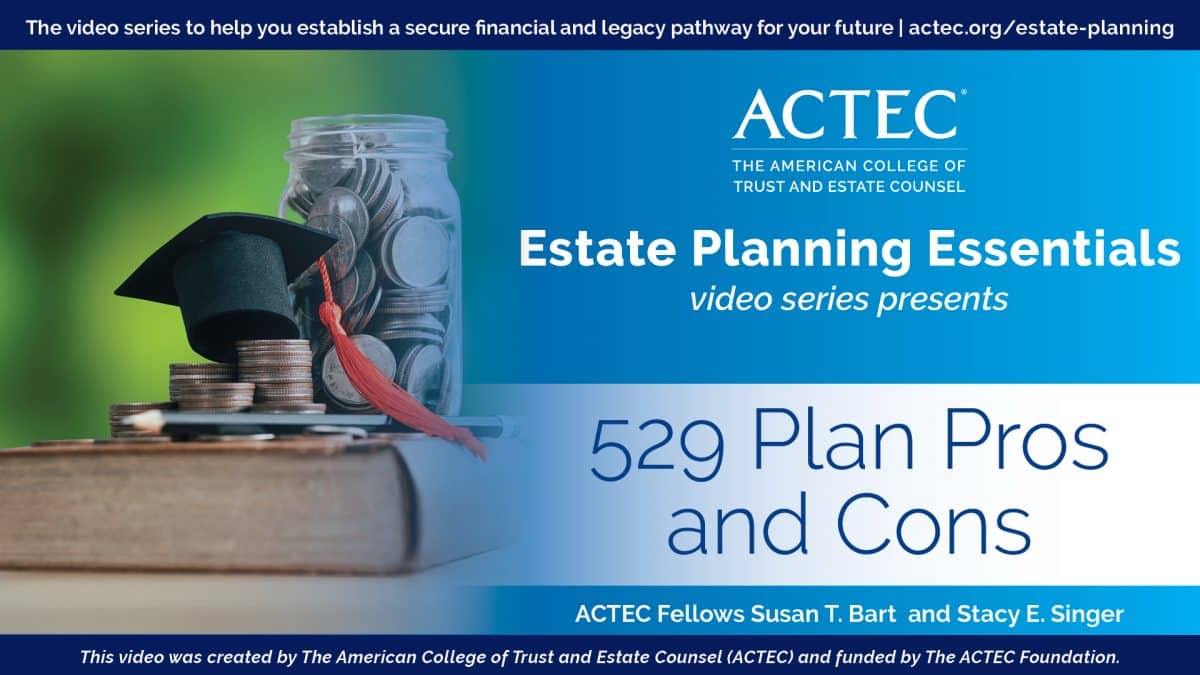Transferring assets to a minor child typically requires establishing a custodial account or trust managed by an adult custodian or trustee until the child reaches the age of majority. This ensures the minor’s financial well-being and compliance with legal regulations governing minors’ ownership of assets.
ACTEC Fellows Jonathan W. Michael and Sandra L. Perkins explain more about how to transfer assets to minor children, the Uniform Transfers to Minors Act (UTMA), 529 plans, naming a caregiver for a minor child in a will and more.
Transcript
Hello, my name is Jonathan Michael. I’m an ACTEC Fellow from Chicago. I’m here today with Sandra Perkins.
Hi, I’m Sandra Perkins. I’m an ACTEC Fellow from Seattle, Washington.
Leaving Money to a Child
Jonathan Michael: Today, we’re going to talk about how to transfer assets to minor children. So, Sandra, I know the question I get quite often is: can I leave money to a minor child?
Sandra Perkins: And the answer is yes, but I don’t generally recommend leaving property or money outright to a minor child because a minor child does not have the legal capacity to manage money. Instead, it’s a better idea to leave the money to an adult or an institution that can manage the money for the benefit of the minor child, and typically that’s done through a trust, a Uniform Transfers to Minors Act (UTMA) account, or a 529 plan.
Jonathan Michael: Now, what is a trust and when would one utilize a trust for purposes of this type of gift?
Sandra Perkins: A trust is a legal arrangement where you name a responsible adult or an institution, called the trustee, to manage the funds for the benefit of the minor beneficiary of the trust; and I generally recommend using a trust when my client is making a larger gift for the benefit of a minor child, say $100,000 or more. You can set forth the terms of the trust in your will or living trust so that it will become effective upon your death for the benefit of the minor child.
You can specify how distributions can and should be made for the benefit of the minor child, say health, support, maintenance, education, down payment on a house, things like that. You can also specify the termination ages for the trust and that can be any age that you want and the trust can even last for the beneficiary’s entire lifetime, and there’s another family video that goes into a lot more detail about trusts.
Uniform Transfers to Minors Act (UTMA) Explanation
Jonathan Michael: So, you mentioned a Uniform Transfers to Minors Act account. Now, what is that, and when would you use it?
Sandra Perkins: The Uniform Transfers to Minors Act is a statute that’s been adopted in all 50 states, and it sets forth an arrangement for making gifts for the benefit of minor children — sort of like a trust — except it’s a lot less flexible. The terms of the arrangement are set forth in the statute itself. I generally recommend using a Uniform Transfers to Minors Act account when my client wants to make a smaller gift for the benefit of a minor child. Typically, depending on the state, the Uniform Transfers to Minors Act account has to terminate at ages 18, 21 or 25. Sometimes you can choose among those ages, but during the term of the trust, the custodian can make distributions for the beneficiary’s health, support, maintenance and education.
529 Plan Explanation
Jonathan Michael: Now, you mentioned a little earlier that there is a thing that’s called a Section 529 Plan account. Now, what is that and when would you use it?
Sandra Perkins: So, a Section 529 Plan is a very highly tax-favored account that people can use to save for children’s education expenses, and the earnings in the account grow income tax-free; and if they’re distributed for qualified education expenses, they can be distributed income tax-free. Now, typically these have been used to save for college expenses, although recently, the rules have been liberalized to allow for some pre-college expenses. I generally recommend these be used if my client is absolutely sure they want their gift to be used for education expenses, and it’s particularly convenient when the beneficiary already has an existing 529 plan that we can just add it to the client’s will.
Recommended Minimum Age to Leave Money to a Child
Jonathan Michael: How about: at what age do you recommend clients leave property to a child outright?
Sandra Perkins: Well, that’s a great question. Well, the earliest age that you should ever do it is 18 because that’s when the child actually has legal capacity. I never recommend 18. I don’t even recommend 21 anymore. When I first started practicing law in 1980, we had all these trusts that terminated at age 21. You never see that anymore. I typically now, recommend at least age 25 and often 30 or 35. It’s just taking longer for young people to get financially launched these days, and so the trust termination ages have been climbing as well.
Jonathan Michael: Now, one question I get a lot from clients is, “Well, how do I name someone to take care of my child, who is a minor, when I pass away?” What are your thoughts?
Identifying a Guardian
Sandra Perkins: Well, it is definitely possible to name an individual or a couple as the guardians of your minor children, and that’s usually done in a person’s will. Some states will allow you to do it in a document separate from a will.
In Washington, we can even do it in a power of attorney so that if somebody becomes incapacitated, there’s a guardian to take care of their children. The most important thing about naming a guardian is to be sure and talk to the people that you’re naming as guardians. You do not want them to find out after you’ve died that they’ve been named as the guardian of your minor children. It’s also really important to name a backup guardian because circumstances can change, and maybe your first choice won’t be able to do it. You want to be sure there’s somebody there. Otherwise, there could be a fight over the custody of your children.
Jonathan Michael: Thank you, Sandra, for your time today in helping us all learn something about how to transfer assets to minor children.
Sandra Perkins: Well, thank you, Jonathan.
Featured Video
529 Plan Pros and Cons
Estate experts explain what to know about how 529 Plans and educational savings plans work when saving for children's higher education instead of retirement.
ACTEC Estate Planning Essentials

ACTEC Fellows provide answers to frequently asked trust and estate planning questions in this video series.



